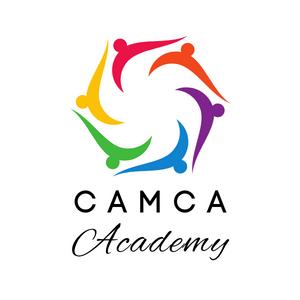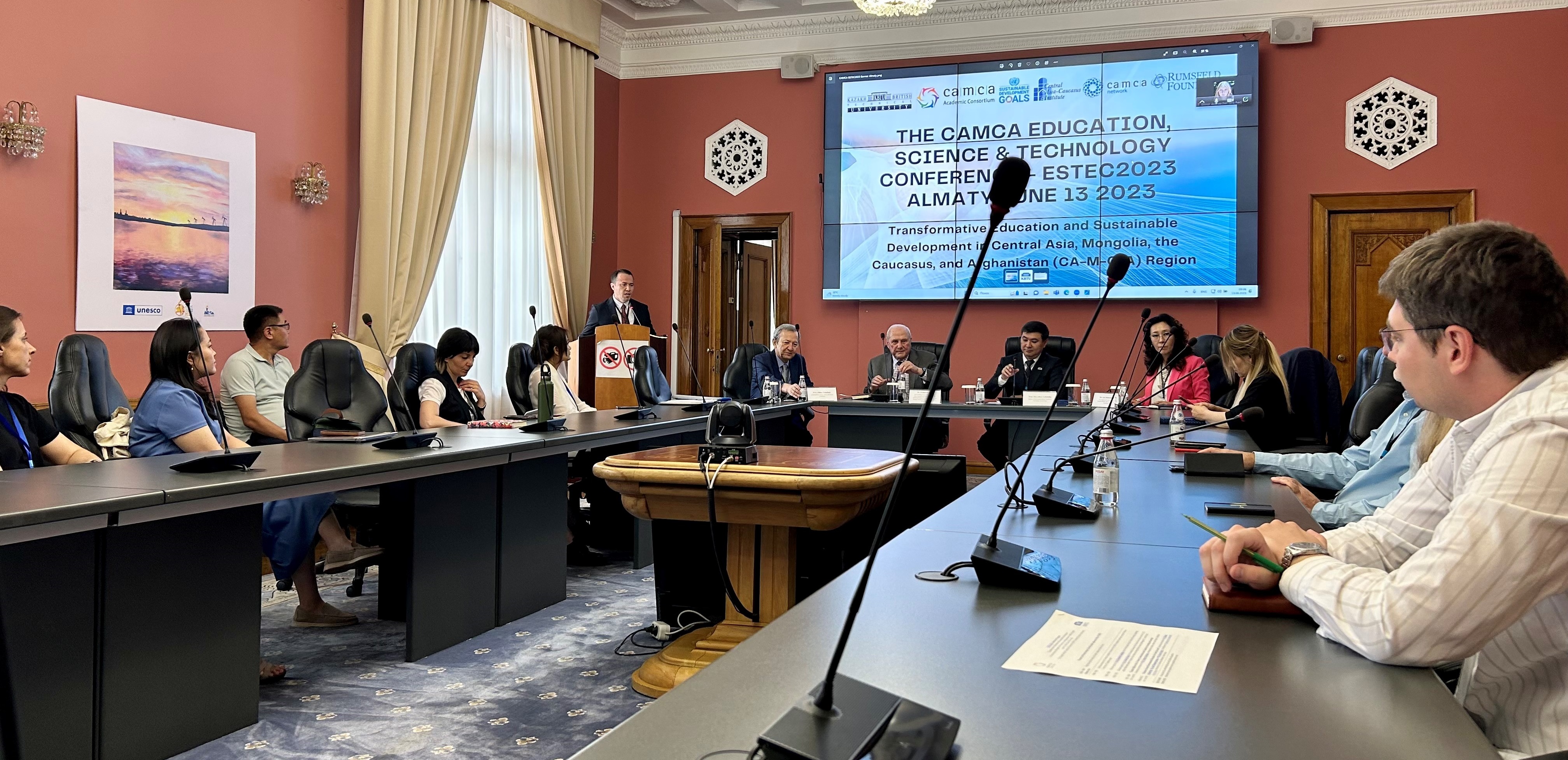We were pleased to interview Dr. Murod Ismailov on two important regional education initiatives he recently founded: CAMCA Academy and the CAMCA Academic Consortium. Murod participated in our CAMCA Fellowship Program with the Central Asia-Caucasus Institute in the fall of 2009. Now, more than a decade after his time as a Fellow, Murod is working to pay forward the benefits received from his own professional experiences in order to advance educational institutions across the entire CAMCA region. The Foundation is privileged to play a small part in the evolution of such impactful regionally focused endeavors by our talented alumni.
 1. What is the mission of CAMCA Academy and the CAMCA Academic Consortium?
1. What is the mission of CAMCA Academy and the CAMCA Academic Consortium?
CAMCA Academy and the CAMCA Academic Consortium formally came into existence this past June, just one year following initial conversations at last year’s CAMCA Regional Forum, and I believe will mark the start of a new chapter in the educational narratives of Central Asia, Mongolia, the Caucasus and Afghanistan. The CAMCA Academy is a unique institution dedicated to shaping the next generation of the region’s thinkers and achievers. Its mission is to provide students with an education that is both rooted in sustainability and transformative in its approach, ensuring they are well-prepared for the challenges and opportunities of tomorrow. Complementing the Academy’s vision, the CAMCA Academic Consortium acts as a bridge linking universities and educational institutions across this part of the world. The Consortium encourages a spirit of regional collaboration and information sharing, and allows for the testing of new educational ideas, the sharing of best practices, and, most importantly, the creation of stronger regional ties through education. Together, these two entities signal a clear intent: to uplift the educational standards of the region while fostering a spirit of unity and collaboration.
2. Can you tell us a bit about the founding of these initiatives and what inspired you to start them?
The idea for these initiatives grew out of the continued expansion of the CAMCA Network. As our community gained more and more members actively involved in education, it was clear there was a unique opportunity before us. With this collective expertise, we had the foundation upon which to spearhead projects that could truly benefit our region.
On a personal note, as a participant of one of the earliest cohorts of CAMCA Fellows back in 2009, I had the distinct privilege to meet with the late Secretary Donald Rumsfeld multiple times. He would often share his hopes and aspirations with us, emphasizing not just the generation of ideas for a more prosperous CAMCA region, but the imperative to act on them. It was his wish that each Fellow would both envision and enact change after they returned home. It is time we honor that sentiment and take decisive action. Also, like many others in our network, I had the chance to benefit from a modern, learner-centered education. We know the doors that this kind of education can open. So, we thought: why not give the region’s younger generation the same opportunity? We want to use our expertise and resources to support the next wave of leaders and change-makers.
3. What are your key objectives and initiatives at this point in time?
As for our immediate initiatives, we are launching a series of online workshops and webinars to connect educators from different parts of the region. With our Consortium members, we are also in the process of developing collaborative research projects that address pressing educational challenges, with a keen focus on digital learning adaptations, human-centric educational practices and environment-conscious curriculums.
As for our long-term vision, I would like to emphasize the following four objectives:
Educational Access and Quality: Our primary objective is to ensure that students across Central Asia, Mongolia, the Caucasus and Afghanistan have access to world-class educational resources and methodologies. Leveraging the collective knowledge of our network, we aim to introduce innovative curricula and teaching techniques that meet the demands of the 21st century.
Collaborative Initiatives: The CAMCA Academic Consortium is dedicated to fostering ties between universities and educational institutions across the region. By creating platforms for knowledge exchange and joint research, we hope to drive educational advancements that would otherwise be challenging to achieve individually.
Sustainable Development Focus: Both the Academy and Consortium are deeply committed to integrating sustainable development principles into education. We believe that by equipping our students with a strong understanding of sustainability, we are preparing them to be conscientious leaders of tomorrow.
Empowering Educators: Recognizing the pivotal role of educators, we are investing in comprehensive training programs. By upskilling our teachers, we ensure that the quality of education imparted is consistently high and in tune with global standards.
4. Please share a bit about the kick-off events that you organized alongside the 2023 CAMCA Regional Forum in Almaty, Kazakhstan this past June.
In conjunction with the 2023 CAMCA Regional Forum held in Almaty, Kazakhstan, we had the pleasure of organizing three pivotal launch events, testifying to the spirit and mission of the CAMCA Academy and Consortium:

ESTEC 2023 Conference: In collaboration with our esteemed partner, the Kazakh-British Technical University (KBTU), we launched the inaugural CAMCA Education, Science, and Technology Conference, “ESTEC 2023.” Centered around the theme of "Transformative Education," ESTEC 2023 brought together over 40 distinguished educators and researchers from across the region. The lively discussions revolved around the challenges, innovations and future trajectories in the realm of transformative learning, ensuring a rich exchange of ideas. (Pictured at right)
Teacher Development Workshop: Recognizing the backbone of any educational institution – the educators themselves – we curated a professional development workshop for teachers from eight different universities in Kazakhstan. Focused on “Interactive Teaching and Learning: A Constructivist Approach”, the workshop explored the nuances of creating engaging classroom environments that foster critical thinking and encourage student participation. We hoped to rejuvenate traditional teaching methodologies, empowering educators to adapt to the evolving educational landscape.
CAMCA Regional Forum Panel & Signing of MOUs: A major highlight was our panel discussion on the future of education in the CAMCA region. Graced by the presence of the Minister of Education and Science of Kazakhstan, the discourse was both insightful and future oriented. Marking a significant milestone for our Consortium, we also proudly signed Memorandums of Understanding with six new esteemed members: ADA University of Azerbaijan, Kazakh-British Technical University, Almaty Management University, Central Eurasian Studies Society, International Information Technology University and the IT Center from the Kyrgyz Republic. Founded merely six months ago, the Consortium's growth trajectory stands as a testament to our collective vision and the region's commitment to educational excellence. (MOU signing with Almaty Management University pictured below.)
- Hear Murod speaking at the CAMCA Forum. -
5. How have other members of the CAMCA Network been involved and supportive of the launching of the Academy and Consortium?
The creation of the CAMCA Academy and Consortium are, in large part, a collective achievement. While the dream was big, the unwavering support from the broader CAMCA Network ensured that this dream transformed into a tangible reality. A number of CAMCA Fellows, leveraging their significant positions in the educational sector – be it as founders of universities or as influential thought leaders – played a pivotal role in the early stages. Their expertise, networks and firsthand understanding of the educational challenges and opportunities in the CAMCA countries were instrumental.
In addition, central to our efforts has been the immense support from the Rumsfeld Foundation and the Central Asia-Caucasus Institute. Their belief in our mission and their commitment to fostering educational growth in the CAMCA region provided a strong foundation upon which we could build.
It is often said that a vision is only as good as the people behind it. In our case, the collective strength, wisdom and passion of the CAMCA Network ensured that our vision for the Academy and Consortium not only took flight but soared.
6. What are some of your upcoming projects and goals?
As the CAMCA Academy and Consortium set their sights on the future, a tapestry of plans and aspirations unfurls before us. Central to our efforts will be fostering regional collaboration. Imagine a realm where students and faculty seamlessly move across borders, engaging with peers in different CAMCA countries. This shared understanding and collaborative spirit is what we aim to catalyze.
Then there is the digital frontier. In a world where the traditional classroom is rapidly evolving, our focus is to harness technology and develop a robust digital platform. Through this, educators, students and researchers can connect, share and grow, with access to online courses, insightful webinars and collaborative research opportunities.
Research and innovation will remain as our guide posts. We are enthusiastic about championing those bright minds that delve into sustainable development and transformative education. By offering grants and scholarships, we hope to kindle this spirit of inquiry.
Education is nothing without educators. Reflecting upon the success of our past workshops, it is evident that there is a crucial need to empower our teachers with cutting-edge pedagogical strategies and tools. Thus, we are charting out advanced training programs that resonate with the needs of today's dynamic learning environment.
7. What type of institutions would be a good fit to collaborate with your projects? How can they get involved?
Our projects at the CAMCA Academy and Consortium exemplify innovation, collaboration and a relentless pursuit of excellence in education. We seek collaborators that echo these values and are eager to forge cross-border partnerships, foster innovative learning environments and contribute to a unified educational vision for the CAMCA region.
Universities & Higher Education Institutes: Institutions that prioritize research-driven pedagogy and share a keen interest in sustainable development and transformative education through collaborative projects.
EdTech Companies: Organizations that are at the forefront of educational technology, offering tools or platforms that can enhance digital learning experiences and promote a culture of interactive, online education.
Research Institutions: Research entities that are deeply involved in shaping educational policies and have a wealth of knowledge that can guide our initiatives.
Educational NGOs: Grassroot organizations that are eager to partner in outreach and awareness campaigns.
If an institution sees a synergy with our vision and projects, getting involved is straightforward. They can reach out to us directly through our official website (www.camca.academy) or contact our regional team. We are always eager to discuss potential collaborations, understand mutual objectives and explore how we can collectively elevate the educational landscape of the CAMCA region.
Dr. Murod Ismailov serves as President and Founder of the CAMCA Academy and CAMCA Academic Consortium. He concurrently serves as Associate Professor of Transformative Education at the University of Tsukuba and a Visiting Professor of Policy Studies at the Tokyo University of Foreign Studies in Japan. Find Murod’s full bio here and learn more about the CAMCA Academy and Academic Consortium at www.camca.academy/. Learn more about the CAMCA Regional Forum at www.camcaforum.org.

